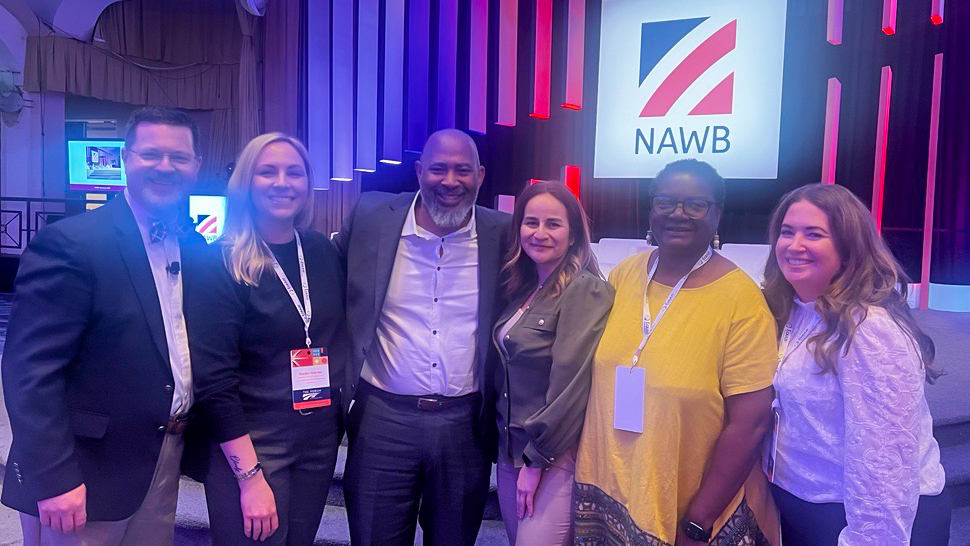
The National Association of Workforce Boards (NAWB) recently convened the largest annual workforce development conference, “The Forum,” in Washington, D.C. Over four days, the event featured over 200 speakers across more than 60 sessions, offering a comprehensive platform for discussions on workforce trends and strategies. As the San Diego Workforce Partnership (SDWP) and other workforce development entities continue to navigate complex challenges, The Forum catalyzed collaboration, innovation and collective action toward building a resilient and inclusive workforce ecosystem.
Several SDWP staff members attended, including Interim President and CEO Tony Young, Haley Stanton and Alejandra Aceves. Stanton and Aceves had the opportunity to speak on a panel discussing our work on the Supplemental Nutrition Assistance Program (SNAP) Employment and Training (E&T) initiative.
“The participation of the San Diego Workforce Partnership at the nation’s premier workforce development conference underscores our commitment to advancing skills and opportunities for the communities we serve,” said interim president and CEO Tony Young. “By leveraging insights and forging partnerships on a national scale, SDWP remains at the forefront of driving meaningful change in workforce development.”
Below, workforce leaders Tracy Eckard, Haley Stanton and Minola Clark Manson share the valuable insights they garnered from the various sessions and presentations they attended. Their engagement underscored the opportunity for collaboration and knowledge exchange with workforce development professionals nationwide.
Setting the Tone
Among the conference’s highlights were the opening remarks by NAWB board chair Lisanne McNew, and president and CEO Brad Turner-Little. Turner-Little emphasized the significance of the work done by all attendees and set the tone for insightful discussions throughout the event. Noteworthy was the keynote address by Eric Termuende, a renowned leader in workforce trends, who emphasized the importance of trust within teams and communities.
The conference also saw distinguished speakers such as acting secretary of labor Julie Su, Maryland Governor Wes Moore, and resilience trainer Kristen Christy, who provided inspiring perspectives on the future of America’s workforce.
Embracing Trust and Collaboration
Eric Termuende’s emphasis on trust within teams and communities by understanding the holistic needs of staff and communities resonated throughout the conference. Building trust is essential for effective workforce development partnerships and initiatives. Prioritizing trust-building activities and open communication channels using trauma-informed approaches centered around employee and client well-being is critical to strengthening workforce development locally.
Creating Regional Strategies Turn Challenges into Opportunities
Each region faces unique challenges. Designing inclusive, tailored strategies to address these needs is crucial for maximizing workforce development impact. Regions should thoroughly assess their workforce dynamics and collaborate with local stakeholders to design targeted interventions.
Integrating SNAP E&T Programs
SNAP E&T initiatives offer practical strategies for integrating funding into programming and community workforce efforts. Leveraging SNAP resources can enhance workforce development efforts and support individuals facing economic challenges.
The Growing Need for Funding Strategies Beyond WIOA
In 2022, the Department of Labor launched the “Yes, WIOA Can!” Initiative to clearly define the Workforce Innovation and Opportunity Act’s (WIOA) value in increasing workforce development opportunities in our nation. While the WIOA is an invaluable resource, it does have its restrictions, creating a growing need for workforce boards to diversify their funding sources. Relying solely on WIOA funding limits the scope and sustainability of workforce development initiatives. Identifying alternative funding streams, such as public-private partnerships and grants, to supplement WIOA resources and expand programmatic offerings will allow for more effective workforce development strategies and remove systemic barriers many workforce boards face.
Evolving Apprenticeship Models and Nationally Recognized Certifications
The evolving landscape of apprenticeships and the growing demand for skilled workers was a focal point of discussion. Apprenticeship and nationally recognized certification models benefit job seekers by validating their skills and offering employers across the U.S. with a streamlined hiring process and assurance of competence. To meet this need, workforce boards must stay updated on changes in apprenticeship requirements and industry demands and continue collaborating with industry partners to develop programs aligned with emerging skill needs and career pathways.
